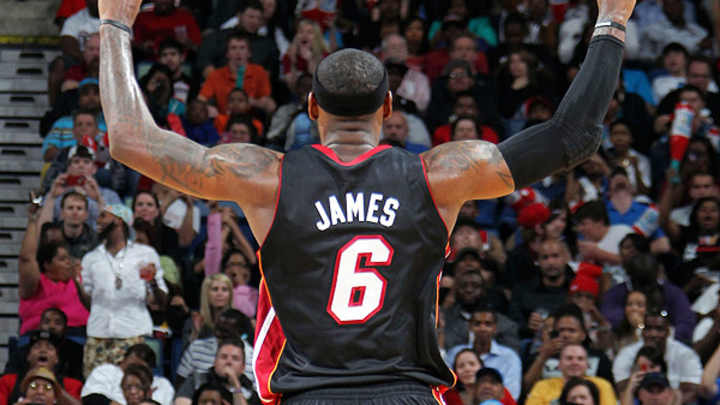The Case For: LeBron James as Most Valuable Player

LeBron James is the reigning regular-season and Finals MVP. (Layne Murdoch Jr./NBAE via Getty Images)

With the end of the regular season fast approaching, we’re taking a closer look at each award race. We’ve already hit on the Sixth Man award, Most Improved,Defensive Player of the Year, Coach of the Year and Rookie of the Year. Here, Rob Mahoney examines the race for MVP.
The NBA has its share of otherworldly scorers, standout defenders and exceptional playmakers, but let's not kid ourselves: This year's MVP race is an open and shut case. LeBron James has made this season his own, and it's to his great credit that there are no dark-horse alternative to his dominance of the league. He is this season's most valuable player, and to claim otherwise would require deep-running contrarianism or blissful ignorance of the league at large.
James, it seems, is forever in the act of becoming. His march toward the title in 2012 appeared to mark his self-actualization as a player, as he engaged the Heat's small-ball style in a way that brought out the best in all involved. The replacement of a court-clogging big man with another perimeter shooter meant that the floor was open for James to attack without compromise, and that he did -- to the tune of 30.3 points, 9.7 rebounds, and 5.6 assists per game throughout Miami's playoff run. It was a remarkable stretch, but James didn't rest on his laurels, returning in force months later to reclaim his persistent upward trajectory. He was already the best player in the league, but this season saw him rise to wondrous new heights.
Already a fantastic passer, James advanced his playmaking supremacy this season as the chief operator of a hyper-potent Heat offense. He easily averages 7.3 assists, with his never-failing court vision allowing him to see every play through to its most logical end. Further, his cross-court passes have never been more precise, as James manufactures 2.6 three-pointers per game by way of his assists alone (not to mention his other feeds that wind up uncredited due to a swing pass) -- a mark that is tied for the league lead, according to Hoopdata. Precious few could make claim to being the best passer in the league, but the pinpoint accuracy of those highly difficult passes makes James a convincing choice.
When he's not setting up others, James is finishing plays himself, whether as an unstoppable dribble-drive threat or an increasingly unshakable jump shooter. That one-time weakness (shooting) has become a corresponding strength; James has evolved from a handle-or-cut option into the fifth-best spot-up option in the league (52.8 percent shooting on spot-ups overall, 46.5 on spot-up three-pointers), according to Synergy Sports. James once aimed to heighten his scoring efficiency by curbing his three-point attempts, but that script has since flipped, with him now limiting his off-the-dribble attempts. That evolution has only made the combination of James and Dwyane Wade even more potent, as James can now open the floor for his teammate in the same way that the overall offense opened for him last spring.
One can trace a similar web of influence all across the floor, where James has unmatched command of the game and upholds massive levels of production while making things simple for every member of the Heat. It's by James' broad skill set that Chris Bosh is able to ply his trade as an astoundingly efficient shooter, that Mario Chalmers' inconsistencies are managed and that Ray Allen's defensive deficiency is swept away. It's through James' offensive versatility that Shane Battier becomes an X-factor rather than a mere role player. James' talents balance out Battier's so perfectly that the two can function as an ideal forward tandem. His is the game that makes everything work -- be it in transition, half-court defense or the other mechanisms of the game that power the best team in the NBA.
We can try our damnedest to evaluate James quantitatively, but even that effort only takes us so far. Even in a league where excess is admired, James' brilliance shines through most evidently in his restraint. He could claim the NBA scoring title if he were so inclined, but behind each of his on-court decisions is the knowledge of those shots not forced and those mistakes not made. In that, James not only toes the line between high-usage influence and incredibly efficient play that every star should strive for, but he also teases the latent potential of which we can only dream. As good as James and the Heat are, the wrinkles in their efficiency suggest they could be even better behind a maxed-out James embracing the outer reaches of his game. The postseason may be just the setting necessary to awaken that borderline-scary dimension of James' performance, but then again the Heat may find no challenger worthy of that extra gear. LeBron, and the Heat, are simply that far ahead.
And so we open the case for this season's MVP award only to promptly shut it. We can certainly celebrate the likes of Kevin Durant or Chris Paul, each having an outstanding season, and I'd encourage you to laud their exploits. But even calling those outstanding talents "MVP candidates" seems to denote an open competition for this award that simply does not exist.
My full fake ballot for this year's MVP:
1. LeBron James, Miami Heat
2. Kevin Durant, Oklahoma City Thunder
3. Chris Paul, Los Angeles Clippers
4. Dwyane Wade, Miami Heat
5. Marc Gasol, Memphis Grizzlies
